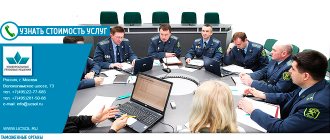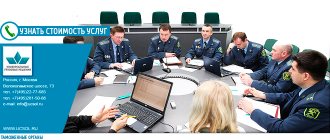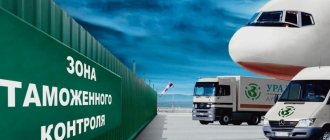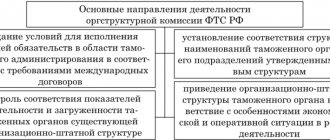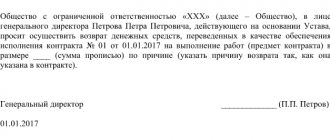Customs service as a special type
Civil service
Lecture – 4 hours.
Practical lesson – 2 hours.
Issues covered:
1. Customs service as a special type of public service.
2. Categories of persons, personnel composition of the customs authorities of the Russian Federation.
3. The procedure and conditions for serving in the customs authorities of the Russian Federation.
4. Requirements for officials of the customs authorities of the Russian Federation.
Slide 1
The customs service is a special type of public service of citizens carrying out professional activities to implement the functions, rights and responsibilities of customs authorities that are part of the system of law enforcement agencies of the Russian Federation.
A special (special) type of public service is characterized by:
¨ the specifics of the tasks and functions performed, job responsibilities;
¨ special conditions of service associated with the use of physical force, special means and weapons;
¨ special conditions and procedure for entering the service, completing it, assigning special ranks, certification, termination of service;
¨ the establishment of special support (salary, social benefits, insignia, uniform, etc.), as well as some other features.
Principles of public service:
¨ the supremacy of the Constitution of the Russian Federation and federal laws over all other normative legal acts;
¨ priority of human and civil rights and freedoms, their direct effect;
¨ federalism, ensuring the unity of the public service system and compliance with the constitutional division of jurisdiction and powers between federal government bodies and government bodies of the constituent entities of the Federation;
¨ equal access of citizens to service in customs authorities in accordance with abilities and professional training;
¨ obligatory for civil servants of decisions made by higher state bodies and managers within the limits of their powers and in accordance with the legislation of the Russian Federation;
¨ unity of legal and organizational foundations of the civil service;
¨ staff stability.
Slide 2
Significance and structure of the customs service
The significance of the legislative recognition of the customs service as a type of federal public service is emphasized by the following facts:
n confirmation of the place of customs authorities in the system of state authorities as a state structure whose activities are aimed at ensuring the integrity of the Russian federal state and the unity of the system of state power;
n dissemination of uniform requirements for the legal status of customs officers as federal civil servants, taking into account the specifics of their activities;
n clear identification of criteria for the selection, placement and rational use of customs personnel, their professional training and improvement of business qualifications;
n providing customs officers with a degree of material, social and legal protection no less than other civil servants.
three types of structural divisions:
n operational (customs operations and customs control, economic work and law enforcement, etc.);
n functional (personnel, financial planning, legal, information and documentation support, economic, logistics and support, etc.);
n staff (organizational-inspector, organizational-analytical, operational-duty, etc.).
Slide3
Categories of persons working (employees)
39. The concept of customs service. Principles of customs clearanceService in customs authorities can be considered in both a broad and narrow sense. In a broad sense, the customs service is a certain set of customs authorities and various bodies and organizations included in the structure of the customs system, as well as the legal status of state customs officials and the procedure for their passage through the customs service. In a narrow sense, the customs service can be considered as a professional activity, the conditions and procedure for which are clearly defined.
The customs service is a special type of public service of citizens of the Russian Federation who carry out professional activities to implement the functions, rights and responsibilities of customs authorities included in the system of law enforcement agencies of the Russian Federation (Article 1 of the Federal Law of the Russian Federation of July 21, 1997 No. 114-FZ “On the Service in the customs authorities of the Russian Federation").
Passage of customs service in customs authorities is based on certain principles, namely:
1) the supremacy of the Constitution of the Russian Federation of federal laws over all other regulatory legal acts when customs employees perform their official functions and duties;
2) priority of the rights and freedoms of man and citizen, i.e. customs officers are obliged to recognize and protect the rights and freedoms of man and citizen when passing through their customs service;
3) the unity of the system of state power and the delimitation of jurisdiction between the Russian Federation and its subjects;
4) the unity of the basic requirements for the civil service, on the basis of which the entire customs service system is built;
5) the principle of transparency in the implementation of public service - provides that customs authorities must provide objective information about their activities and their decisions;
6) equal access of citizens to public service - means that every citizen of the Russian Federation has the right to undergo customs service at the customs authorities in accordance with their professional training;
7) the principle of professionalism and competence of civil servants;
 mandatory for civil servants decisions of higher bodies and officials adopted by them within the limits of their powers and competence in accordance with the legislation of the Russian Federation;
mandatory for civil servants decisions of higher bodies and officials adopted by them within the limits of their powers and competence in accordance with the legislation of the Russian Federation;
9) responsibility of state customs officials for decisions prepared and made, for failure to fulfill or for improper performance of their official duties;
10) non-partisan civil service and separation of religious associations from the state;
11) the principle of social protection of civil servants;
12) the principle of stability of civil servants.
Table of contents
Digital library
Jurisprudence / Customs law / 4.1 Concept, principles and features of the state customs service
The concept of “customs service,” like many other legal categories, can be considered in the broad and narrow sense of the word. In a broad sense
The words “customs service” should be understood as
the totality of customs authorities and institutions of the customs authority system, the legal status of officials of customs authorities, as well as the procedure and conditions for performing public service in customs authorities and institutions of the customs authority system
.
Customs service in the narrow sense
– this is
a type of professional activity to ensure the powers of customs authorities.
It is on the understanding of the customs service as a type of professional activity that what is formulated in Art. 1 of the Federal Law of the Russian Federation July 21, 1997 No. 114-FZ “On service in the customs authorities of the Russian Federation” definition of service in the customs authorities - service in the customs authorities (customs service) is a special type of public service of citizens of the Russian Federation carrying out professional activities in the implementation of functions, rights and responsibilities of customs authorities included in the system of law enforcement agencies of the Russian Federation.
The customs service as a type of professional activity means the continuous, successive, competent execution of relevant powers by persons holding public positions in customs authorities.
State service in the customs sphere is also official activity in organizations and enterprises subordinate to the Federal Customs Service (institutions of the customs authorities system), only by those officials who have been assigned special ranks in accordance with the procedure established by the federal law of the Russian Federation “On Service in Customs Authorities” or in accordance with Federal Law of July 27, 2004 No. 79-FZ “On the State Civil Service of the Russian Federation” awarded class ranks.
At the same time, not every professional activity in customs authorities and institutions of the customs authorities system is a state customs service. For the purpose of technical support for the activities of customs authorities, their staffing schedules provide for the corresponding positions of customs employees whose professional activities are not related to the implementation of the functions, rights and responsibilities of customs authorities. The list of such positions is determined by the Head of the Federal Customs Service of Russia, and work in the customs authorities in such positions is not a state customs service.
The State Customs Service is based on the norms of the Customs Code of the Russian Federation, the federal law “On Service in Customs Authorities” and the federal law “On the State Civil Service of the Russian Federation” and is built in accordance with the general principles of organizing the public service in the Russian Federation, enshrined in the Constitution of the Russian Federation and the Federal Law of May 27, 2003 No. 58-FZ “On the civil service system of the Russian Federation” (as amended on November 11, 2003).
The state customs service should be built in accordance with the general principles of public service in the Russian Federation. Let us formulate these principles
in relation to the state customs service.
When implementing the state customs service, the principle of the supremacy of the Constitution of the Russian Federation and federal laws
over all other regulatory legal acts, job descriptions, etc. Violation of this principle entails bringing the officials responsible for this to justice, even criminal liability.
The principle of priority of human and civil rights and freedoms
is that, when exercising their powers, state customs officials are obliged to recognize, respect and protect the rights and freedoms of man and citizen.
In accordance with the principle of unity of the system of state power and delimitation of jurisdiction
between the Russian Federation and its constituent entities, the state customs service belongs to the federal public service and is under the exclusive jurisdiction of the Russian Federation.
From the principle of unity of the system of state power follows the principle of unity of the basic requirements for the public service
, in accordance with which the entire public service system in the Russian Federation is built, including the state customs service.
Such unity in the customs service is ensured by the unity of the system of customs authorities and institutions of the system of customs authorities, the unity of tasks and functions in this system.
In accordance with the principle of equal access of citizens to public service
all citizens of the Russian Federation, without any discrimination, in accordance with their abilities and professional training, have the right to fill positions in customs authorities and institutions of the customs authorities system. The requirements for a candidate for a position are determined solely by the nature of the job duties.
The principle of professionalism and competence
civil servants is one of the guarantees of the correct organization and normal functioning of the state customs service. Given the complex, multifunctional nature of customs, it is important to emphasize the need for both general and specialized training for customs officers.
The principle of binding decisions of higher bodies and officials for civil servants
adopted by them within the limits of their powers and in accordance with the law, also applies to the state customs service.
In accordance with the principle of transparency
In the implementation of public service, the Customs Code of the Russian Federation provides for the institution of information and consultation on customs issues. The norms of Ch. 4 of the TMK of the Russian Federation establishes the obligation of customs authorities to provide information on decisions taken, actions or reasons for inaction of customs authorities and their officials, as well as on the provisions of current customs legislation.
The principle of responsibility of state customs officials
for prepared and made decisions, for failure to perform or improper performance of their official duties, occupies a special place in the system of the state customs service.
The relationship between state customs officials and political parties and religious associations is determined by the constitutional principles of freedom of opinion, freedom of conscience and religion ( the principle of non-partisan civil service
). Persons in the customs service enjoy the freedom to profess any religion or not to profess any, freedom to belong to any political parties and associations, as well as the right to nominate themselves for elections from any political party. At the same time, in accordance with the principles of public service under consideration, the creation of any parties, movements and associations pursuing political goals in the customs authorities and institutions of the customs authorities system is not allowed.
In accordance with the principle of social protection of civil servants
The state guarantees state customs officials a stable salary, paid vacations, pensions, medical care and other guarantees.
Principle of stability of civil service
is that the position of a state customs officer should not depend on the political situation in the country, on the specific personality of the political leader and on any unreasonable organizational improvisations of higher officials.
Rights, duties and responsibilities of customs authorities
To perform the functions assigned to the customs authorities, they are vested with powers, the list and scope of which is set out in Art. 315-317 TK. In accordance with Art. 315 of the Labor Code, customs authorities have the right to:
— take measures provided for by the Labor Code in order to ensure compliance with the customs legislation of the Republic of Belarus;
-require documents, information, the presentation of which is provided in accordance with the provisions of the Labor Code;
-check citizens and officials participating in customs operations for documents proving their identity;
-require from individuals and legal entities confirmation of authority to perform certain actions or carry out certain activities in the field of customs affairs;
-carry out, in accordance with the legislation, operational-search activities for the purpose of preventing, identifying, suppressing and solving crimes, carrying out urgent investigative actions and inquiring into cases in which laws are assigned to the jurisdiction of customs authorities, identifying and identifying the persons preparing, committing or committing them, as well as ensuring one’s own safety;
-carry out urgent investigative actions and inquiries within the limits of their competence and in the manner determined by criminal procedure legislation;
-carry out proceedings in cases of administrative offenses and hold persons accountable for committing administrative offenses in accordance with the law;
-to use, in urgent cases, means of communication or vehicles belonging to organizations (except for means of communication and vehicles of diplomatic missions, consular offices, other official representations of foreign states, as well as international organizations), to prevent crimes, conduct urgent investigative actions and inquiry into cases in which laws are assigned to the jurisdiction of customs authorities, prosecution and detention of persons who have committed such crimes or are suspected of committing them. Property damage incurred in such cases by the owners of communication means or vehicles is compensated by the customs authorities at the request of the owners of communication means or vehicles in the manner established by the Government of the Republic of Belarus, unless otherwise determined by the President of the Republic of Belarus.
- detain, in the manner prescribed by law, persons suspected of committing crimes, who have committed or are committing crimes or administrative offenses, the proceedings of which are within the competence of the customs authorities;
— make documentation, video and audio recording, filming and photography of facts and events related to the movement of goods across the customs border and the transportation, storage of goods under customs control, and the implementation of cargo operations with them;
— receive from government bodies and other organizations and individuals the information necessary to perform their functions in accordance with the provisions of the Labor Code;
— submit written warnings to the heads of state bodies and other organizations, as well as citizens, with demands to eliminate violations of customs legislation and monitor compliance with these requirements;
- bring claims and applications to the courts for the forced collection of customs duties, interest and penalties at the expense of the payer’s property, as well as in other cases provided for by the Labor Code and other legislative acts;
— carry out other actions provided for by the Labor Code, other laws and (or) acts of the President of the Republic of Belarus;
In accordance with the provisions of Art. Art. 9-10 of the Labor Code, the customs authorities are obliged to provide information on issues of customs regulation and other issues within the competence of the customs authorities, as well as consultation on issues of customs regulation and other issues within the competence of the customs authorities.
Within the framework of the penultimate paragraph, in particular, the provisions of Art. 316 and art. 317 of the Labor Code secures the rights of customs authorities when carrying out customs control using watercraft and aircraft of customs authorities, as well as the rights of customs authorities in relation to motor vehicles transporting goods under customs control.
The rights of customs are also provided for by the Law of the Republic of Belarus “On Customs Tariffs”, regulatory legal acts of the State Customs Committee and other legislation of the Republic of Belarus on customs, including the rights:
-to issue, within its competence, law enforcement acts to implement the legislation of the Republic of Belarus on customs affairs;
-conduct, within the competence of customs, correspondence with customs authorities, organizations and citizens of the Republic of Belarus, as well as, in agreement with the State Customs Committee with the customs services of the CIS member states on issues of interdepartmental cooperation, and in cases provided for by the relevant agreements, with the customs authorities of neighboring states;
-involve, in accordance with the legislation of the Republic of Belarus, specialists from other law enforcement and regulatory authorities, organizations, regardless of forms of ownership and subordination, as well as experts to assist in carrying out customs control;
— give permission to place goods and vehicles under a certain customs regime;
-carry out customs inspection and carry out customs control in other forms;
-require from declarants, carriers and other persons with authority in relation to goods and vehicles to assist in customs clearance, conduct customs control and perform other functions assigned to the customs authorities of the Republic of Belarus;
- in accordance with the legislation of the Republic of Belarus, collect unpaid customs duties in an indisputable manner;
-in accordance with the criminal procedural legislation of the Republic of Belarus, initiate criminal cases if there are signs of smuggling and other crimes in the field of customs, and others.
When performing their official duties, customs officials have the right to carry, store, use and use firearms. In cases and in the manner prescribed by the State Customs Code, customs officials have the right to use physical force, special means and firearms; consider and make decisions on complaints and appeals from organizations and citizens, as well as protests from prosecutors regarding compliance by customs officials with the legislation of the Republic of Belarus on customs and other rights.
For illegal decisions, unlawful actions (inaction), customs officials bear disciplinary, administrative, criminal and other liability in accordance with the law. Customs authorities, in accordance with civil and other legislation, compensate for damage caused to persons and their property as a result of illegal decisions, unlawful actions (inaction) of officials of such customs authorities in the performance of their official or labor duties. Damage caused by lawful actions of customs authorities and their officials is not subject to compensation, unless otherwise provided by the Labor Code and other legislative acts (Article 320 of the Labor Code of the Republic of Belarus).



